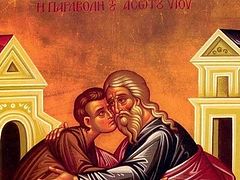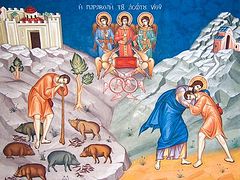Sermon given at the vigil for the Sunday of the Prodigal Son, in the Holy Trinity Church, Moscow, February 11, 2017.
In the name of the Father, the Son, and the Holy Spirit.
What amazing words we have heard today in the Church’s hymnography: “Open to me the doors of repentance, O Life-giver. For my spirit rises early to pray towards Thy holy temple, bearing the temple of my body all defiled…”
In these words is an awareness of yourself, your place in the world; in them is repentance, which God expects from every one of His sons and daughters. But by far not everyone rises to those spiritual heights at which the understanding comes that you are at fault for the defiling of God’s temple—that very temple that God has entrusted to your soul. What? know ye not that your body is the temple of the Holy Ghost which is in you, which ye have of God, and ye are not your own? (1 Cor. 6:19).
Tomorrow at the Divine Liturgy the parable of a father and two sons will be read for us. One of these sons was outwardly obedient to the father. The second ran away from his father’s love to wallow in sin and passions. But it so happens that the latter is the one who was able stop and shudder as he becomes aware of the scope of the monstrous act he has committed before Heaven and his father. His spirit ascends to the highest heights attainable to human beings—he entered into the awareness that the temple of his soul is monstrously defiled. He himself had robbed and defiled his father’s inheritance; namely, life, love, care, goodness, and tenderness. He himself trampled upon the best of everything he had, destroying it and profaning it.
The prodigal son realized all this. And this is what each person is called to do. After the fall, after every one of us without exception became a prodigal son—whether we admit it or ignore it in our complacency—and God the Father is waiting for only one thing from us: the awareness of our blindness and mistakes. Without this we are simply incapable of stopping our headlong fall into the abyss of eternal death.
The second son in the parable never left the father physically. But in spirit he was, consciously, in a land just as far away as his brother. Only as opposed to the prodigal son the “righteous” son, who left his father, didn’t return to him. Together with his soul mate the self-righteous Pharisee, he turned out to be incapable of what is most important for man on earth—ascending to the heights of repentance, giving rise to communion with God and peace with Him. The exemplary behavior of the “righteous one” in the parable along with the Pharisee is grateful from the bottom of his heart that he is not like his good-for-nothing brother—that prodigal son who squandered his father’s inheritance with harlots! But why are you, father, so unfairly condescending and kind to him? How dare you forgive him? This, after he has squandered your wealth, which after all could have belonged to me?! After he has wallowed to his heart’s content in sin, which I have been forbidding myself all this time? Why do you pay any attention to him, and not to me—who am worthy of your attention?
This elder, righteous and hopelessly lost man is also the prodigal son, also an unhappy child. Our brother is a threatening example for all who appear to abide correctly in the father’s house.
Fortunately for us, there is yet another son in the parable—the One Who is narrating it to us. He is the One Whom the Father sends for the salvation of these and other prodigal children, for the salvation of each and every one of us. It is He in Whom there is the fullness of the Divinity: Father, Son, and Holy Spirit, Who sacrifices Himself for us.
The prodigal son found the path away from his destruction. From the spiritual point of view the older brother has only one way out—the one that the holy fathers of the Church suggest to us. It is the sincere recognition that “there is no one worse than me.” Probably we all know this expression. But even here we often manage to successfully convert the cross-bearing courage of spiritually abiding in this truth into a comfortable hypocrisy of a barren knowledge of correct formulas.
Great Lent is upon us. It has one aim—to attain what God is expecting from us: We shall correct our lives through repentance.
Amen.





